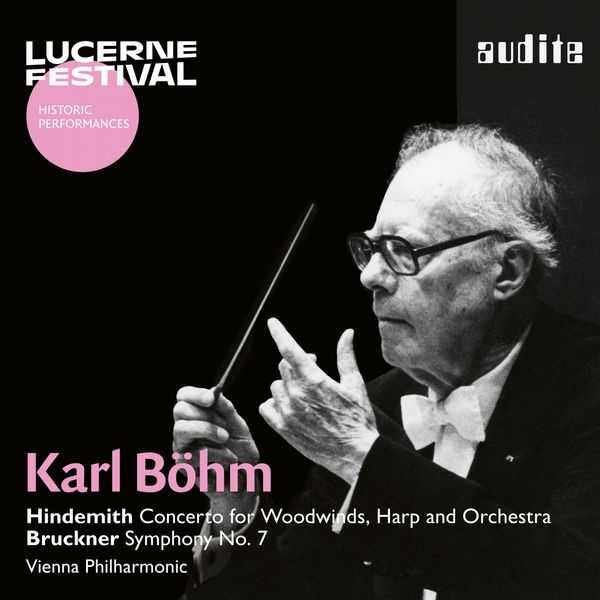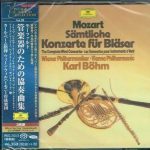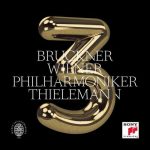

Composer: Anton Bruckner, Paul Hindemith
Performer: Werner Tripp, Gerhard Turetschek, Alfred Prinz, Ernst Pamperl, Hubert Jelinek
Orchestra: Wiener Philharmoniker
Conductor: Karl Böhm
Format: FLAC (tracks)
Label: Audite
Catalogue: AUDITE95649
Release: 2021
Size: 558 MB
Recovery: +3%
Scan: yes
Hindemith: Concerto for winds, harp and orchestra
01. I. Massig, schnell
02. II. Grazioso
03. III. Rondo. Ziemlich schnell
Bruckner: Symphony No. 7 in E Major (Modified 1885 Version, ed. A. Gutmann)
04. I. Allegro moderato
05. II. Adagio. Sehr feierlich und sehr langsam
06. III. Scherzo. Sehr schnell
07. IV. Finale. Bewegt, doch nicht schnell
Between 1950 and 1980, he was one of the eminent conductors of international standing, and yet in the meantime he has somewhat faded into obscurity: Karl Böhm epitomised the anti-star amongst the great conductors of his time, emphatically at the service of music alone. Now available for the first time are two Lucerne concert recordings made with the Vienna Philharmonic, with whom he was closely associated for decades: Bruckner’s Seventh Symphony alongside a buoyant Hindemith Concerto (the latter recorded only once by Böhm).
An advocate for contemporary music in his youth, Böhm performed Paul Hindemith’s Concerto for Woodwinds, Harp and Orchestra (1949) in Lucerne in the summer of 1970. Cast in three movements, this work offers especially rewarding passages to the five-part concertino grouping and, via a quotation of Mendelssohn’s Wedding March, refers to Hindemith’s own silver wedding anniversary.
Alongside symphonic works of Mozart, Beethoven, Schubert, Brahms and Strauss, Anton Bruckner’s symphonies were also at the centre of Böhm’s concert repertoire. Böhm’s Bruckner interpretations possess a special aura, though he neither follows the pious, pathos-laden manner of Eugen Jochum, nor the solemn worldly style of Sergiu Celibidache, nor the austere and matter-of-fact interpretations of Nikolaus Harnoncourt. This is also demonstrated by the Lucerne concert recording of the Seventh Symphony, made in September 1964: Böhm never loses sight of the whole, but plays out every articulatory detail as notated, with almost scrupulous textual fidelity. He follows Bruckner’s block-like editing technique without aggressively emphasising it. He does not evade the solemn monumentality of the music, but he also does not exaggerate it into a sense of false, violent pathos.
In cooperation with audite, Lucerne Festival presents the “Historic Performances” series featuring outstanding concert recordings of artists who have shaped the festival throughout its history. The aim of this edition is to rediscover treasures – most of which have not previously been released – from the first six decades of the festival, which was founded in 1938 with a special gala concert conducted by Arturo Toscanini. These recordings have been made available by the archives of SRF Swiss Radio and Television, which has broadcast the Lucerne concerts from the outset. Painstakingly re-mastered and supplemented with photos and materials from the Lucerne Festival archive, they represent a sonic history of the festival.



